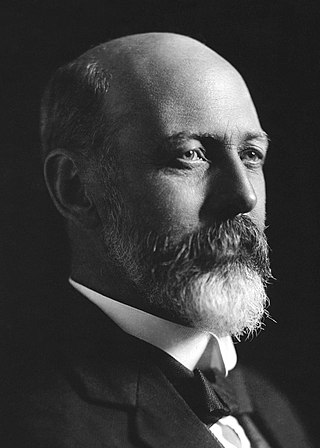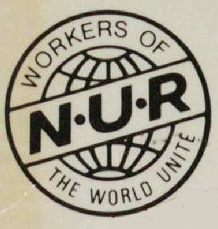
David Lloyd George, 1st Earl Lloyd-George of Dwyfor, was Prime Minister of the United Kingdom from 1916 to 1922. A Liberal Party statesman and politician from Wales, he was known for leading the United Kingdom during the First World War, for social-reform policies, for his role in the Paris Peace Conference, and for negotiating the establishment of the Irish Free State. He was the last Liberal Party prime minister; the party fell into third-party status shortly after the end of his premiership.

Andrew Fisher was an Australian politician who served three terms as prime minister of Australia – from 1908 to 1909, from 1910 to 1913, and from 1914 to 1915. He was the leader of the Australian Labor Party (ALP) from 1907 to 1915.

Protectionism, sometimes referred to as trade protectionism, is the economic policy of restricting imports from other countries through methods such as tariffs on imported goods, import quotas, and a variety of other government regulations. Proponents argue that protectionist policies shield the producers, businesses, and workers of the import-competing sector in the country from foreign competitors. Opponents argue that protectionist policies reduce trade and adversely affect consumers in general as well as the producers and workers in export sectors, both in the country implementing protectionist policies and in the countries protected against.

Sir George Houston Reid, was an Australian politician who led the Reid Government as the fourth Prime Minister of Australia, from 1904 to 1905, having previously been Premier of New South Wales from 1894 to 1899. He led the Free Trade Party from 1891 to 1908.

Sir Joseph Cook, was an Australian politician who was the sixth Prime Minister of Australia, in office from 1913 to 1914. He was the leader of the Liberal Party from 1913 to 1917, after earlier serving as the leader of the Anti-Socialist Party from 1908 to 1909.
The Free Trade Party which was officially known as the Australian Free Trade and Liberal Association, also referred to as the Revenue Tariff Party in some states, was an Australian political party, formally organised in 1887 in New South Wales, in time for the 1887 colony election, which the party won. It advocated the abolition of protectionism, especially protective tariffs and other restrictions on trade, arguing that this would create greater prosperity for all. However, many members also advocated use of minimal tariffs for government revenue purposes only. Its most prominent leader was George Reid, who led the Reid Government as the fourth Prime Minister of Australia (1904–05). In New South Wales it was succeeded by the Liberal and Reform Association in 1902, and federally by the Anti-Socialist Party in 1906. In 1909, the Anti-Socialist Party merged with the Protectionist Party to form the Commonwealth Liberal Party.

The Anti-Corn Law League was a successful political movement in Great Britian aimed at the abolition of the unpopular Corn Laws, which protected landowners’ interests by levying taxes on imported wheat, thus raising the price of bread at a time when factory-owners were trying to cut wages. The League was a middle-class nationwide organisation that held many well-attended rallies on the premise that a crusade was needed to convince parliament to repeal the corn laws. Its long-term goals included the removal of feudal privileges, which it denounced as impeding progress, lowering economic well-being, and restricting freedom. The League play little role in the final act in 1846 when Sir Robert Peel led the successful battle for repeal. However, its experience provided a model that was widely adopted in Britain and other democratic nations to demonstrate the organisation of a political pressure group with the popular base.
The Radicals were a loose parliamentary political grouping in Great Britain and Ireland in the early to mid-19th century who drew on earlier ideas of radicalism and helped to transform the Whigs into the Liberal Party.
The Liberal Party was a parliamentary party in Australian federal politics between 1909 and 1917. The party was founded under Alfred Deakin's leadership as a merger of the Protectionist Party and Anti-Socialist Party, an event known as the Fusion.

Raymond William Postgate was an English socialist, writer, journalist and editor, social historian, mystery novelist, and gourmet who founded the Good Food Guide. He was a member of the Postgate family.

The National Union of Railwaymen was a trade union of railway workers in the United Kingdom. The largest railway workers' union in the country, it was influential in the national trade union movement.

The United Kingdom was a leading Allied Power during the First World War of 1914–1918. They fought against the Central Powers, mainly Germany. The armed forces were greatly expanded and reorganised—the war marked the founding of the Royal Air Force. The highly controversial introduction, in January 1916, of conscription for the first time in British history followed the raising of one of the largest all-volunteer army in history, known as Kitchener's Army, of more than 2,000,000 men. The outbreak of war was a socially unifying event. Enthusiasm was widespread in 1914, and was similar to that across Europe.

The Conscription Crisis of 1918 stemmed from a move by the British government to impose conscription in Ireland in April 1918 during the First World War. Vigorous opposition was led by trade unions, Irish nationalist parties and Roman Catholic bishops and priests. A conscription law was passed but was never put in effect; no one in Ireland was drafted into the British Army. The proposal and backlash galvanised support for political parties which advocated Irish separatism and influenced events in the lead-up to the Irish War of Independence.
Manchester Liberalism comprises the political, economic and social movements of the 19th century that originated in Manchester, England. Led by Richard Cobden and John Bright, it won a wide hearing for its argument that free trade would lead to a more equitable society, making essential products available to all. Its most famous activity was the Anti-Corn Law League that called for repeal of the Corn Laws that kept food prices high. It expounded the social and economic implications of free trade and laissez-faire capitalism. The Manchester School took the theories of economic liberalism advocated by classical economists such as Adam Smith and made them the basis for government policy. It also promoted pacifism, anti-slavery, freedom of the press and separation of church and state.

The 219th Brigade was a Home Service formation of the British Army during the First and the Second World Wars.
The Dundee by-election was a Parliamentary by-election held on 9 May 1908. The constituency returned two Members of Parliament (MP) to the House of Commons of the United Kingdom, elected by the first past the post voting system.
The Scottish Democratic Fascist Party (SDFP) or Scottish Fascist Democratic Party was a political party in Scotland. It was founded in 1933 out of the Scottish section of the New Party by William Weir Gilmour and Major Hume Sleigh.
This article lists the Labour Party's election results in elections from it adopting the "Labour Party" name in 1906 until the end of the 1918 to 1922 Parliament.
This article lists the Labour Party's election results from the 1922 United Kingdom general election to 1929, including by-elections.
Tom Brown (1900–1974) was a British anarcho-syndicalist trade unionist, anti-fascist, engineer and writer. Brown contributed articles to papers including War Commentary, Freedom, and Direct Action alongside authoring numerous pamphlets. Brown was known for his compelling public speaking and ability to communicate effectively in everyday terms. He placed a strong emphasis on federated local groups rather than centralism, and on workplace-based revolutionary trade unionism.










